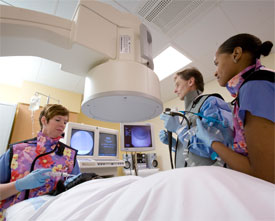
Adam B. Elfant, MD, performs a colorectal cancer screening at the Cooper Digestive Health Institute in Mount Laurel.
Each year, more than 140,000 Americans are diagnosed with colorectal cancer, according to the American Cancer Society. The second leading cause of cancer-related deaths in the United States, colorectal cancer starts in either the colon or the rectum and affects men slightly more than women. The lifetime risk for developing colorectal cancer is about 1 in 20 (5.1 percent). This year, colorectal cancer is expected to cause nearly 50,000 deaths.
“Despite the staggering statistics, there is optimistic news,” explains Adam B. Elfant, MD, a gastroenterologist at the Cooper Digestive Health Institute in Mount Laurel, N.J., and New Jersey Governor of the American College of Gastroenterology. “Thanks to better, more regular screenings, more aggressive treatment of polyps, and improved surgical and cancer treatment, the death rate from colorectal cancer has been steadily decreasing for more than 20 years. There are now more than one million colorectal cancer survivors in the United States today.”
Colorectal cancer screening, the process of looking for cancer in people who have no symptoms of the disease, is a powerful weapon for preventing colorectal cancer deaths. Dr. Elfant recommends that all patients understand their personal risk and follow screening guidelines recommended by their physicians. “Because most early colorectal cancers produce no symptoms, it’s only through screening that many cases of the disease are caught in early stages,” he says. “And we know that catching and treating colorectal cancers early significantly improves recovery and survival.”
In general, colonoscopy is recommended every 10 years. Colonoscopy screening procedures have improved dramatically in the past decade. Colonoscopy is performed as an outpatient procedure while the patient is sedated. For individuals without significant risk factors, the American College of Gastroenterology recommends colonoscopy beginning at age 50, and age 45 for African Americans. However, if a person has certain risk factors, screening might be recommended at an earlier age and more frequently. Those risk factors include: personal history of colorectal cancer or colorectal polyps; strong family history of the disease; inherited forms of colorectal polyps or cancer; chronic digestive condition such as inflammatory bowel disease (Crohn’s disease or ulcerative colitis).
While most colorectal cancers produce no symptoms, there are some symptoms that may or may not accompany the disease, including: new onset of pain; blood in or on the stool or a change in stool caliber or shape; a change in typical bowel habits, constipation, and diarrhea. “If a patient is experiencing any of these symptoms, he or she needs to share that information with a physician right away so screening recommendations can be revised. It could be a matter of life and death,” warns Dr. Elfant.
In addition to colonoscopy, other available colon cancer screening tests include flexible sigmoidoscopy, which examines only the lower part of the colon; CT colonography or “virtual colonoscopy”, an x-ray designed to look for colon polyps and cancers; and fecal testing, which can indicate the presence of cancer, but not polyps.
“Colonoscopy is still the gold standard for colorectal cancer screening,” says Dr. Elfant. “It allows the physician to examine both the upper and lower part of the colon and actually remove polyps during the procedure. Since we know that polyps can grow and develop into colon cancer, colonoscopy is an important tool in the prevention of colon cancer.”
The board-certified gastroenterologists of the Cooper Digestive Institute in Mount Laurel have state-of-the-art outpatient facilities dedicated to a full range of diagnostic testing, including colonoscopy screening. Call 1.800.8.COOPER for more information or to schedule an appointment.
